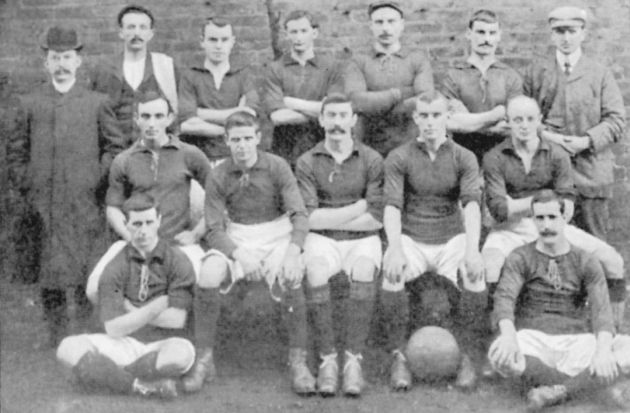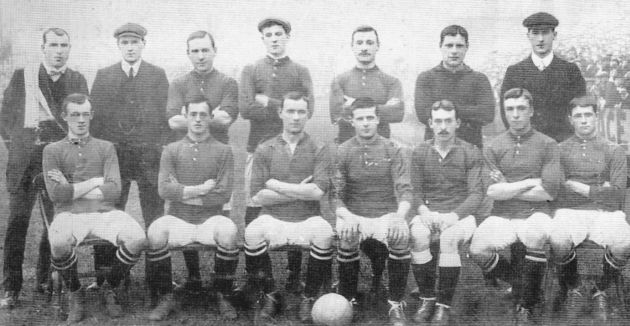Back in Division Two there was to be no swift return to the top division of English football and even before the 1900/01 season had kicked off some notable figures, such as Archie Livingstone, Walter Place Snr, Walter Place Jnr and Edgar Chadwick were on their way out of Turf Moor.
The supporters of the day were expecting another immediate promotion and it all looked possible when we started that 1900/01 season with six wins out of seven. Even in February we were top but a run of one win in eight cost us and we ended the season in 3rd place.
Things weren’t going too well for Burnley financially, placed in a poor town and with clubs from bigger towns and cities now passing us. Some things clearly don’t change but the FA, in an attempt to combat spiralling wage bills, introduced a £4 per week maximum wage and also stopped any player from being paid a win bonus.
Burnley were selling their better players and bringing in cheap options and attendances started to drop when it became clear that there would be no chance of a promotion in 1901/02.
We finished 9th but if you think that’s bad then the 1902/03 season proved to be much worse. It ended with Burnley bottom of Division Two and we held on to our league status only because Doncaster, who had finished two places above us with five points more, failed to win re-election and were replaced by Bradford City.
Managers weren’t sacked at the drop of a hat a hundred years or so ago but had the pressure been the same as they are today then I’m sure there would have been some chants of ‘Mangnall Out’.
 |
| Spen Whittaker (back right) with his first Burnley team |
As it happened the directors of the time had that decision taken away from them, Mangnall left for Manchester United and went on to have great success with them. They replaced him with manager number four, and our first full time manager, Spen Whittaker.
Whittaker had a difficult job, a struggling team, a club with little money and attendances at an all time low and he was the youngest manager in the entire league at just thirty-two years of age.
He brought about an immediate improvement, although not enough to see us challenging at the top of the league. The improved form saw us end the season in 5th place and very significantly there were more people watching the games as Burnley played in green for the first time.
There was real optimism in the summer of 1904 that we could be set for a return to the First Division but any early hopes were well and truly dashed as we lost an amazing eleven of the first thirteen league games.
An 11th place finish was perhaps not what we were looking for but was far better than we could have dared hope after that dreadful start.
Before the 1905/06 season got underway the league was expanded again with both divisions being increased from eighteen to twenty clubs as the game continued to expand. It even included two more London clubs in Chelsea and Clapton Orient who, being so far away, had to pay other clubs £20 each in expenses when they travelled to play them.
We made a good start but couldn’t maintain it and again we had to settle for a mid-table finish although this time we sneaked into the top half of the league in 9th place.
We’d played an FA Cup tie at non-league Tottenham, losing 2-0, and it was played in front of a crowd of over 20,000 but the home crowds continued to be disappointing despite the town having grown in size by some 50% in just a few years.
The following two seasons saw 7th place finishes but probably the most memorable moment during those two seasons came in April of the 1906/07 season when goalkeeper William Green was ruled out injured. His replacement, making his debut, was the young Jeremiah ‘Jerry’ Dawson who played what was to be the first of 569 games for Burnley. He kept a clean sheet too in a 3-0 win.
 |
| The 1907/08 team with Jerry Dawson fourth from the left on the back row |
The 1908/09 season brought something new to Burnley, a cup run. No matter how good or bad our league form had been it seemed any decent form always deserted us when it came round to that time of the year for the FA Cup. But not this time.
We beat Bristol Rovers, Crystal Palace and Tottenham (the latter two after replays) to reach Round Four for the first time and a home tie against Manchester United.
A massive 25,000, a record for Turf Moor, saw the Tottenham win but no one could have expected what would happen next. Burnley spent money on a new enclosure to increase the capacity to 30,000 and the home crowd were not let down as Burnley played superbly to lead 1-0 with less than twenty minutes to go.
The snow, which had been falling all afternoon, got worse and the Manchester United players complained to the referee and, as is always the case, he took their side and abandoned it. Needless to say when it was replayed Manchester United won through 3-2. It still gets mentioned today, particularly when we get bad weather and you hear the cry of ‘Stop the game it’s snowing’.
The cup run enabled us to clear our debts despite finishing 14th but the new season started optimistically with an 18 year-old wing half by the name of Billy Watson signing after a trial.
We were in mid-table again when the decade came to an end but the season was about to take an unexpected and tragic twist early in the New Year as the next decade got underway
By the end of March attendances were dropping and money was short as it became clear that there would be no promotion at the end of the season.
Whittaker was already planning for the following 1910/11 season and signed centre half Henry Swift from Accrington Stanley in April. He travelled down to London on the Friday night to register Swift with the FA to enable him to play against Manchester City at home the following day but disaster struck when he fell from the train near Crewe.
It is not certain what happened but it is thought he wakened and mistook the outside door for the compartment door and walked straight off the speeding train. He was found badly injured and taken to hospital at Crewe.
Burnley played City the following day without Swift whose registration had not been completed. The players were told that Whittaker was in hospital, but he died shortly before kick off. A memorial fund was set up for his family and eleven days after his death a benefit match was played against Manchester United as the town continued to mourn the sad loss.
The team finished in 14th place in the Second Division, ending the season without a manager as the board decided in the circumstances to wait until the summer to appoint Spen Whittaker’s successor.
